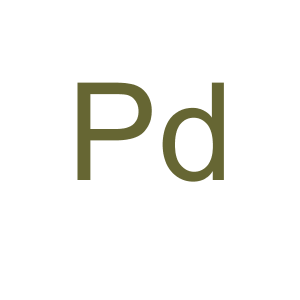| Safety Statements: |
May be a skin sensitizer. This metal in the form of palladium chloride has been administered orally in dosage of about 1 grain daily without apparent ill effects in the treatment of tuberculosis. In the laboratory, palladium appears to bind to many cell components; blocks the action of a number of enzymes and interferes with the use of energy by nerves and muscles; induces lung malfunction and produces abnormal fetuses. Lethal intravenous doses cause appetite loss, hemolysis, renal deposition, and bone marrow damage. Poorly absorbed by the body when ingested. Palladium dust can be a fire and explosion hazard. Combustible in the form of dust when exposed to heat or flame. Explosive reaction with hydrogen + hydrogen peroxide. Reaction with formic acid or sodium tetrahydroborate releases explosive hydrogen gas. Violent reaction with isopropyl alcohol, OF2S. Under the proper conditions it undergoes hazardous reactions with aluminum, arsenic, carbon, methanol, ozonides, sulfur. |


